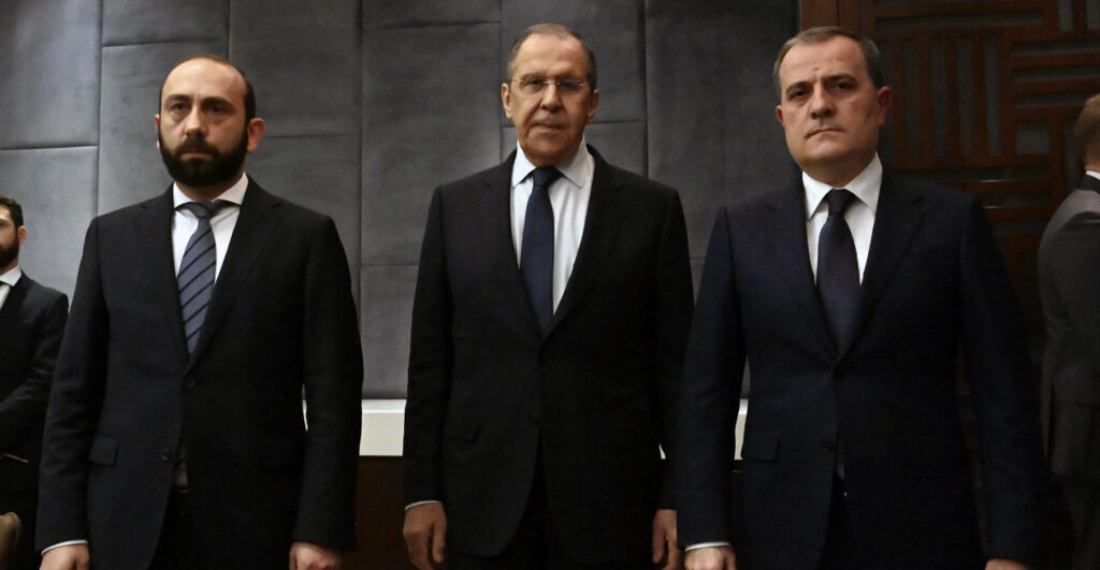On May 12, the Foreign Ministers of Azerbaijan and Armenia held another meeting in Dushanbe, Tajikistan, on the sidelines of the Russia-led Commonwealth of Independent States Ministerial summit, and with the participation of the Russian foreign minister . Although Armenian Foreign Minister Ararat Mirzoyan characterized the meeting as another “productive interaction” between the warring parties, little progress has been made in the peace negotiations between Baku and Yerevan since the 6 April meeting of the leaders of the two countries in Brussels.
Russian Vice-Premier Alexey Overchuk and Deputy Foreign Minister Andrey Ridenko met with Prime Minister Nikol Pashinyan in Yerevan on the same day to discuss the work of the trilateral group on the opening of road and railway transport between Azerbaijan and Armenia.
Despite the existence of earlier formal agreements and meetings regarding the border demarcation/delimitation and deblocking of regional communication between Baku and Yerevan, no tangible steps have been taken toward reconciliation yet. The process looks less attractive from an Armenian point of view, given the current protests of the opposition against Prime Minister Pashinyan and his government. The opposition accuses the current government of making "territorial concessions" (Karabakh) in favor of Azerbaijan under the guise of a peace agreement. The anti-government unrest has increased since it moved closer to normalizing relations with Azerbaijan.
The Azerbaijani Ministry of Foreign Affairs released a statement in the aftermath of the Dushanbe meeting, stating that the ministers " had discussed the conclusion of a peace agreement between the two countries.” Also, the Armenian MFA confirmed the border demarcation meeting would be held in Moscow next week. However, the ongoing political instability in Yerevan suggests that significant progress on the border demarcation with Azerbaijan in the upcoming Moscow meeting is unlikely, and the Azerbaijani side Could not even confirm that the meeting will take place.
Nevertheless, Russia seemingly restored its position as the main stakeholder and stability guarantor in Karabakh negotiation process amid its intervention in Ukraine, gradually attempting to outfox the EU. Indeed, the Kremlin has recently been worried over the EU’s active involvement in the negotiation process between Baku and Yerevan, whilst it is fully focused on the war in Ukraine, and in responding to the harsh anti-Russian sanctions.
Unlike previous Russia-initiated meetings in Sochi and Moscow earlier, the EU-initiated meetings between President Ilham Aliyev and Prime Minister Nikol Pashinyan in Brussels yielded relatively positive results setting a new negotiation format between the two. Therefore, with Dushanbe meeting and the upcoming Moscow meeting on border demarcation, Moscow endeavors to create its own negotiation format to outplay the EU and possibly push it out of the game.
The meeting in Dushanbe led to various speculations in the media on the state of play with regards to the proposed peace agreement. Subsequently, official Yerevan said they delivered a six point peace proposals to Azerbaijan" to set a framework for peace negotiations. In these proposals Armenia still insists on the involvement of the OSCE Minsk Group in the peace process, and underlines the importance of "status" for Karabakh and the ethnic Armenian community as an additional security guarantee.
In reaction, the Azerbaijani authorities could oppose the 6-point proposals, withdraw Baku’s own 5-points proposals, and increase pressure on Yerevan to return to previous negotiation formats established in Brussels and Moscow, which did not mention the participation of the OSCE Minsk Group, and Karabakh's status. Since the end of the 44-day war in Karabakh, official Baku dismissed all debates regarding the status of Karabakh, insisting that it is "unacceptable under new realities." Moreover, the current round of meetings and negotiations can be overshadowed by incidents, similar to the renewed minor skirmishes and fire exchanges between Azerbaijan and Armenia in Karabakh (Kelbajar direction). Considering the absence of significant results in recent meetings of representatives of Azerbaijan and Armenia, endless political instability within Armenia, and Russia's inability to be a real crisis manager, a new round of escalation in Karabakh would soon become inevitable.



